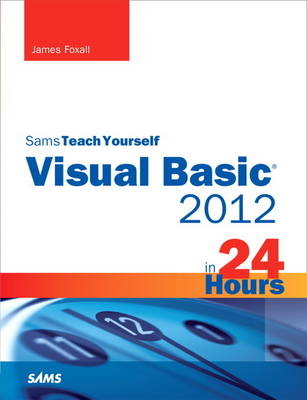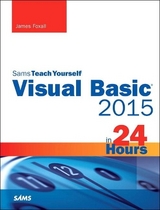
Sams Teach Yourself Visual Basic 2012 in 24 Hours, Complete Starter Kit
Sams Publishing (Verlag)
978-0-672-33629-4 (ISBN)
- Titel erscheint in neuer Auflage
- Artikel merken
Step-by-step instructions carefully walk you through the most common Visual Basic 2012 tasks.
Quizzes and Exercises at the end of each chapter help you test your knowledge.
By the Way notes present interesting information related to the discussion.
Did You Know? tips offer advice or show you easier ways to perform tasks.
Watch Out! cautions alert you to possible problems and give you advice on how to avoid them.
Learn how to…
Navigate the VB 2012 environment and use VB’s powerful new tools
Work with objects, collections, and events
Build attractive, highly functional user interfaces
Make the most of VB 2012’s advanced controls
Create efficient modules and reusable procedures
Store data, make decisions in code, and use loops to improve efficiency
Use powerful object-oriented programming techniques
Interact effectively with users
Work with graphics, text files, and databases
Debug and troubleshoot applications
Manipulate external applications, file systems, and the Windows Registry
Distribute the software you’ve created
On the Web:
Access code examples from the book, as well as updates, and corrections as they become available at informit.com/title/9780672336294
Download Visual Studio 2012 Express for Windows Desktop from www.microsoft.com/visualstudio/eng/downloads
James Foxall is president of Tigerpaw Software, Inc. (www.tigerpawsoftware.com), a Bellevue, Nebraska, Microsoft Certified Partner specializing in software solutions for technology providers. Tigerpaw’s award-winning business automation solution is designed to automate contact management, marketing, service and repair, proposal generation, inventory control, and purchasing. At the start of 2012, the current release of Tigerpaw had more than 35,000 licensed users. Foxall’s experience in creating certified Office-compatible software has made him an authority on application interface and behavior standards of applications for the Microsoft Windows and Microsoft Office environments. Foxall has been writing commercial production Visual Basic code for more than 14 years. He’s the author of numerous books, including Practical Standards for Microsoft Visual Basic and MCSD in a Nutshell: The Visual Basic Exams. He also has written articles for Access-Office-VBA Advisor and Visual Basic Programmer’s Journal. Foxall has a bachelor’s degree in management of information systems (MIS) and a master’s degree in Business Administration (MBA). He is a Microsoft Certified Solution Developer and an international speaker on programming technologies as well as business process improvements. James enjoys spending time with his family, playing guitar, listening to amazing bands, and playing computer games. You can reach him at www.jamesfoxall.com.
Introduction 1
PART I: The Visual Basic 2012 Environment
HOUR 1: Jumping in with Both Feet: A Visual Basic 2012 Programming Tour 5
Starting Visual Basic 2012 . . . . . . . . . 6
Creating a New Project . . . . . . . . . . 7
Understanding the Visual Studio 2012 Environment . . . . . 10
Changing the Characteristics of Objects . . . . . . . 11
Adding Controls to a Form. . . . . . . . . 16
Designing an Interface . . . . . . . . . 17
Writing the Code Behind an Interface . . . . . . . 21
Running a Project . . . . . . . . . . 25
HOUR 2: Navigating Visual Basic 2012 29
Using the Visual Basic 2012 Start Page . . . . . . . 30
Navigating and Customizing the Visual Basic Environment. . . 32
Working with Toolbars. . . . . . . . . . 37
Adding Controls to a Form Using the Toolbox . . . . . . 38
Setting Object Properties Using the Properties Window . . . . 39
Managing Projects . . . . . . . . . . 45
A Quick-and-Dirty Programming Primer . . . . . . 51
Getting Help . . . . . . . . . . . 53
HOUR 3: Understanding Objects and Collections 57
Understanding Objects. . . . . . . . . . 58
Understanding Properties . . . . . . . . . 58
Understanding Methods. . . . . . . . . 65
Building a Simple Object Example Project. . . . . . 67
Understanding Collections . . . . . . . . . 72
Using the Object Browser . . . . . . . . . 75
HOUR 4: Understanding Events 79
Understanding Event-Driven Programming . . . . . . 79
Building an Event Example Project . . . . . . . 87
Keeping Event Names Current . . . . . . . . 92
PART II: Building a User Interface
HOUR 5: Building Forms: The Basics 95
Changing a Form’s Name . . . . . . . . . 96
Changing a Form’s Appearance . . . . . . . . 97
Showing and Hiding Forms. . . . . . . . . 107
HOUR 6: Building Forms: Advanced Techniques 117
Working with Controls . . . . . . . . . 117
Creating Topmost Nonmodal Windows. . . . . . . 134
Creating Transparent Forms . . . . . . . . 135
Creating Scrollable Forms. . . . . . . . . 135
Creating MDI Forms . . . . . . . . . . 137
Setting the Startup Form. . . . . . . . . 140
HOUR 7: Working with Traditional Controls 145
Displaying Static Text with the Label Control . . . . . 145
Allowing Users to Enter Text Using a Text Box . . . . . 146
Creating Buttons. . . . . . . . . . 153
Creating Containers and Groups of Option Buttons . . . . 157
Displaying a List with the List Box . . . . . . . 161
Creating Drop-Down Lists Using the Combo Box . . . . . 168
HOUR 8: Using Advanced Controls 173
Creating Timers . . . . . . . . . . 174
Creating Tabbed Dialog Boxes. . . . . . . . 177
Storing Pictures in an Image List Control. . . . . . 180
Building Enhanced Lists Using the List View Control . . . . 182
Creating Hierarchical Lists Using the
Tree View Control. . . . . . . . . . 187
HOUR 9: Adding Menus and Toolbars to Forms 195
Building Menus . . . . . . . . . . 196
Using the Toolbar Control. . . . . . . . . 207
Creating a Status Bar. . . . . . . . . . 213
PART III: Making Things Happen–Programming
HOUR 10: Creating and Calling Code Procedures 217
Creating Visual Basic Code Modules. . . . . . . 217
Writing Code Procedures . . . . . . . . . 219
Calling Code Procedures. . . . . . . . . 225
Exiting Procedures. . . . . . . . . . 231
Avoiding Infinite Recursion. . . . . . . . . 232
HOUR 11: Using Constants, Data Types, Variables, and Arrays 237
Understanding Data Types . . . . . . . . . 238
Defining and Using Constants. . . . . . . . 242
Declaring and Referencing Variables . . . . . . . 244
Working with Arrays . . . . . . . . . . 250
Determining Scope . . . . . . . . . . 254
Declaring Variables of Static Scope. . . . . . . 258
Naming Conventions. . . . . . . . . . 259
Using Variables in Your Picture Viewer Project . . . . . 261
HOUR 12: Performing Arithmetic, String Manipulation, and Date/Time Adjustments 269
Performing Basic Arithmetic Operations with Visual Basic . . . 270
Comparing Equalities . . . . . . . . . 274
Understanding Boolean Logic . . . . . . . . 274
Manipulating Strings . . . . . . . . . . 278
Working with Dates and Times . . . . . . . . 283
HOUR 13: Making Decisions in Visual Basic Code 293
Making Decisions Using If...Then . . . . . . . 293
Branching Within a Procedure Using GoTo . . . . . . 304
HOUR 14: Looping for Efficiency 309
Looping a Specific Number of Times Using For...Next . . . . 309
Using Do...Loop to Loop an Indeterminate Number of Times . . . 315
HOUR 15: Debugging Your Code 323
Adding Comments to Your Code . . . . . . . . 324
Identifying the Two Basic Types of Errors. . . . . . 326
Using Visual Basic’s Debugging Tools . . . . . . . 328
Writing an Error Handler Using Try...Catch...Finally . . . 336
HOUR 16: Designing Objects Using Classes 347
Understanding Classes . . . . . . . . . 348
Instantiating Objects from Classes . . . . . . . 357
HOUR 17: Interacting with Users 367
Displaying Messages Using the MessageBox.Show() Function . . . 367
Creating Custom Dialog Boxes . . . . . . . . 373
Using InputBox() to Get Information from a User . . . . . 377
Interacting with the Keyboard . . . . . . . . 379
Using the Common Mouse Events . . . . . . . 382
HOUR 18: Working with Graphics 389
Understanding the Graphics Object. . . . . . . 389
Working with Pens . . . . . . . . . . 392
Using System Colors . . . . . . . . . . 393
Working with Rectangles . . . . . . . . . 396
Drawing Shapes . . . . . . . . . . 397
Drawing Text . . . . . . . . . . . 399
Persisting Graphics on a Form. . . . . . . . 400
Building a Graphics Project Example . . . . . . . 400
PART IV: Working with Data
HOUR 19: Performing File Operations 409
Using the OpenFileDialog and SaveFileDialog Controls . . . 409
Manipulating Files with the File Object. . . . . . 415
Manipulating Directories with the Directory Object . . . . 424
HOUR 20: Working with the Registry and Text Files 427
Working with the Registry . . . . . . . . . 427
Reading and Writing Text Files . . . . . . . . 439
HOUR 21: Working with a Database 451
Introducing ADO.NET . . . . . . . . . 452
Manipulating Data . . . . . . . . . . 456
HOUR 22: Controlling Other Applications Using Automation 469
Automating Microsoft Excel . . . . . . . . 470
Automating Microsoft Word . . . . . . . . 476
PART V: Deploying Solutions and Beyond
HOUR 23: Deploying Applications 481
Understanding ClickOnce Technology. . . . . . . 481
Using the Publish Wizard to Create a ClickOnce Application . . . 482
Testing Your Picture Viewer ClickOnce Install Program . . . . 486
Uninstalling an Application You’ve Distributed . . . . . 486
Setting Advanced Options for Creating ClickOnce Programs . . . 488
HOUR 24: The 10,000-Foot View 491
The .NET Framework . . . . . . . . . . 491
Common Language Runtime . . . . . . . . 492
Microsoft Intermediate Language . . . . . . . 493
Namespaces . . . . . . . . . . . 494
Common Type System . . . . . . . . . 496
Garbage Collection . . . . . . . . . . 496
Further Reading . . . . . . . . . . 497
9780672336294, 9/17/2012
| Verlagsort | Indianapolis |
|---|---|
| Sprache | englisch |
| Maße | 181 x 231 mm |
| Gewicht | 794 g |
| Themenwelt | Mathematik / Informatik ► Informatik ► Programmiersprachen / -werkzeuge |
| Informatik ► Software Entwicklung ► Objektorientierung | |
| ISBN-10 | 0-672-33629-4 / 0672336294 |
| ISBN-13 | 978-0-672-33629-4 / 9780672336294 |
| Zustand | Neuware |
| Informationen gemäß Produktsicherheitsverordnung (GPSR) | |
| Haben Sie eine Frage zum Produkt? |
aus dem Bereich



